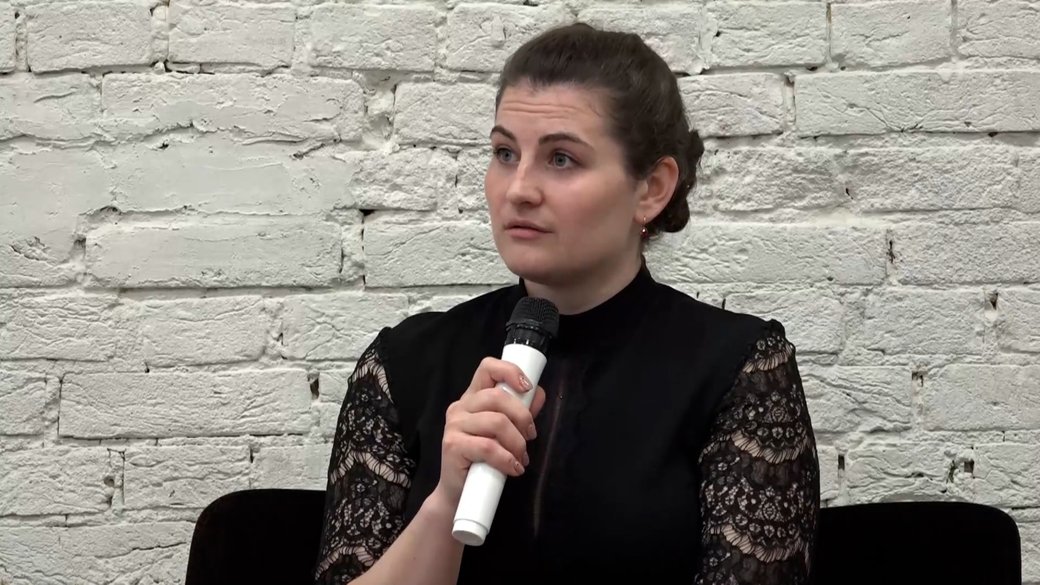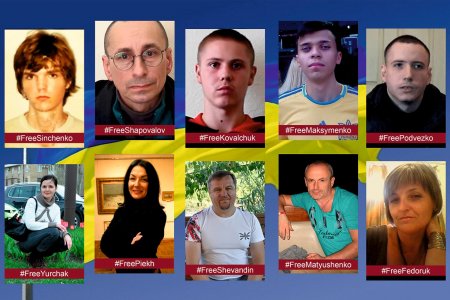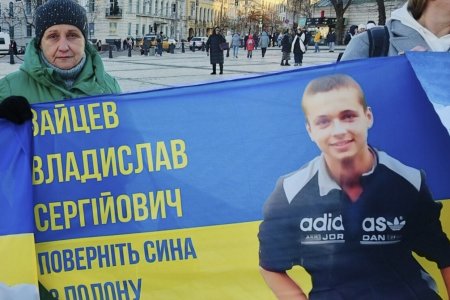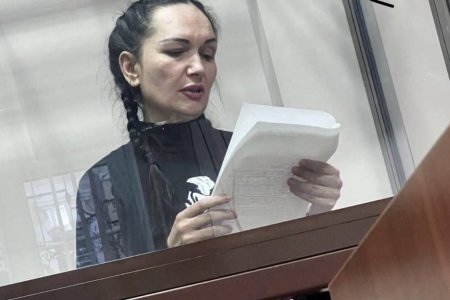
Ukrainian teacher Viktoria Andrusha, and other civilian hostages or prisoners of war, illegally taken to Russia, were forced to sing the Russian national anthem and other Russian militaristic or Soviet songs every day. If they didn’t sing loudly enough, they would be forced to sing it again and again, until the Russians were satisfied. Such psychological coercion was combined, especially in the case of male prisoners, with physical reprisals. All were held together, regardless of whether they were prisoners of war or civilian hostages. The Russians didn’t care what any individual Ukrainian had, or had not, done. As Andrusha explained during a Centre for Civil Liberties press conference on 14 October all were considered ‘guilty’ merely because they were Ukrainian.
Viktoria Andrusha is a 25-year-old Maths and Information Technology teacher from Stary Bykiv (Chernihiv oblast), who was teaching in Brovary (Kyiv oblast). The Russians burst into the family home in Stary Bykiv on 25 March this year, carrying out a ‘search’ which also included banal robbery, before taking Viktoria away. The Russians returned a few days later and seized Viktoria’s mother. She was thrown into a basement and held, blindfolded, for three days, but was then released, unlike her daughter.
Andrusha was accused, by soldiers of the aggressor state invading her country, of providing information to Ukraine’s Armed Forces about the enemy’s movements. The Russians were, in fact, shortly afterwards forced to retreat, but took Andrusha and others to Russia. She was imprisoned, mainly in the Kursk SIZO [remand prison] for over six months before being released in an exchange of prisoners on 29 September.
During the press conference, Andrusha explained that her Russian captors had treated her with particular hatred as they believed her to have directed fire for the Ukrainian Armed Forces. She certainly does not deny that she wrote to the Armed Forces, seemingly using a chatbot to inform of the enemy’s movements. The Russians, however, were incapable of understanding that she was, genuinely, a teacher who worked in a school, and assumed that she had been recruited and possessed some kind of important ‘secret information’. They therefore claimed that she had been engaged in so-called ‘espionage’ and should be put on trial in Russia. They then, however, decided that there was no evidence of that. She was informed that even they acknowledged the lack of any grounds for imprisoning her at the end of May, yet she was still held prisoner for four more months.
It is important to stress that for a very long time the Russians would not admit that they were holding the young woman. She was prevented from seeing a lawyer or having any form of contact with her family. During the press conference, she stressed the important role in her release played by her family who had actively publicized her plight and ensured that international organizations like Human Rights Watch spoke out over her enforced disappearance. Russia is holding a huge number of Ukrainians hostage, both those seized since its full-scale invasion, and at least 300 civilians and POWs held in occupied Donbas for five years of longer. In a huge number of cases, families have absolutely no information about their loved one’s whereabouts, or even whether the person is still alive. Considering the atrocities that we know about in liberated parts of Kyiv and Kharkiv oblasts, it is clear that the families of people who disappeared after encounters with the invaders must be going through hell.
Russia’s seizure and imprisonment of civilian hostages and its treatment of prisoners of war are in grave violation of international law. In their urgent appeal regarding Andrusha’s enforced disappearance in June 2022, Human Rights Watch pointed out that “during an international armed conflict, failure to acknowledge a civilian’s detention or to disclose their whereabouts in custody with the intention of removing them from the protection of the law for a prolonged period, constitutes the crime of enforced disappearance under international law. It is prosecutable as a crime against humanity under the International Criminal Court’s statute.”
All the Ukrainians were held in a near-total information vacuum and were deliberately fed disinformation as part of the methods of psychological pressure.
It appears that the violence was meted about by special force officers not the SIZO administration, but the latter were clearly aware what these ‘spetsnaz’ officers in balaclavas were doing. Women prisoners were constantly threatened with having their heads shaven, like the men.
Viktoria Andrusha is now safely home in Ukraine, with the public outcry over her imprisonment having undoubtedly helped to secure her freedom. Russia is, however, holding hundreds of civilian hostages and prisoners of war, including those seized long before Russia’s full-scale invasion for their support for or defence of Ukraine.



